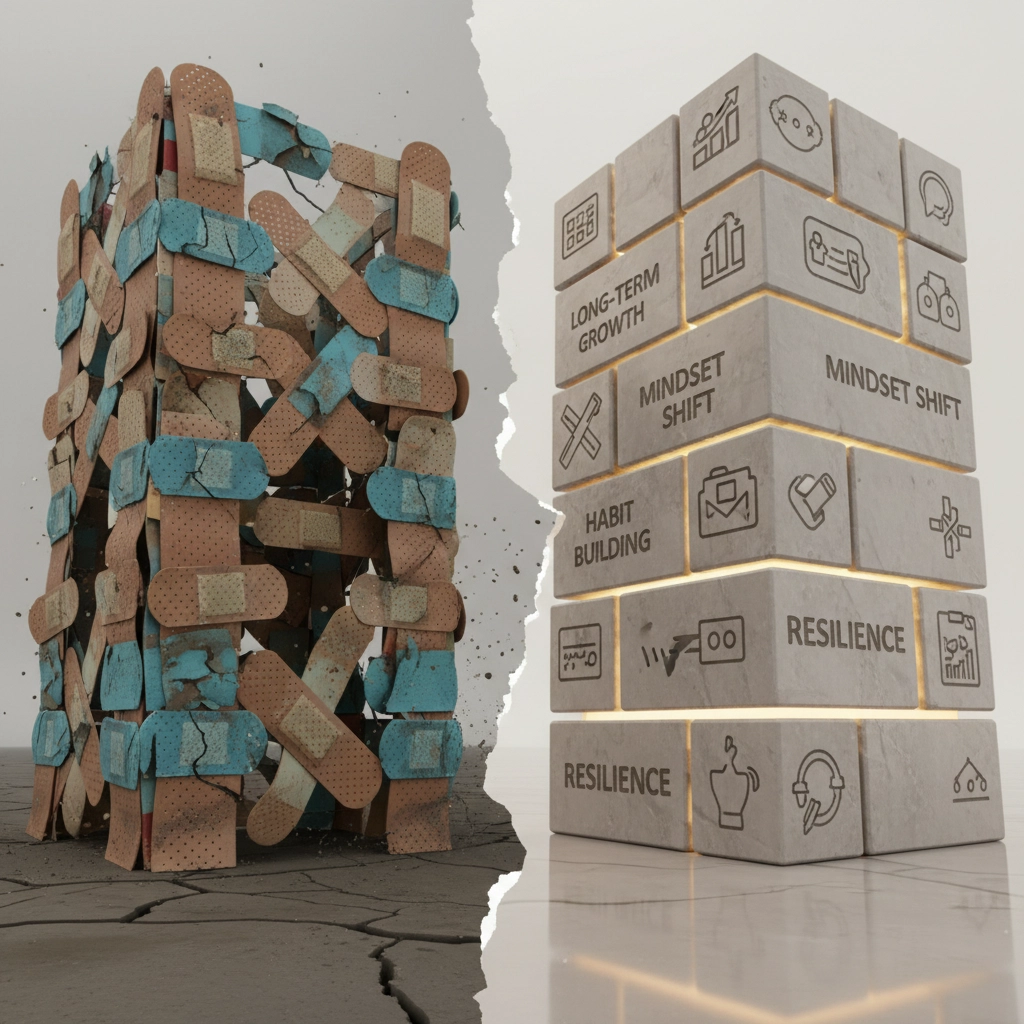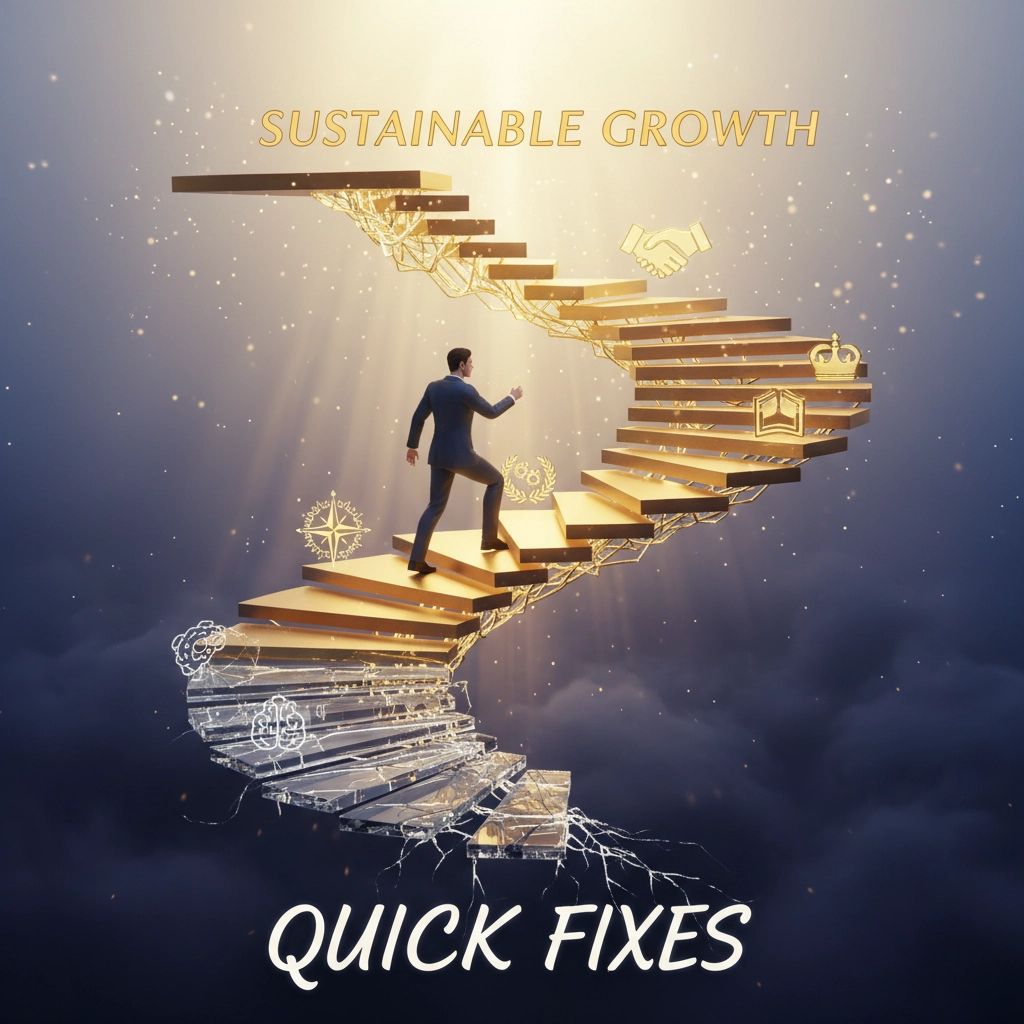The coaching industry is having its "Netflix moment." Just like how streaming killed Blockbuster's quick rental model, sustainable transformation coaching is making quick-fix programs look like relics from a bygone era.
Walk into any corporate office today and you'll hear the same story: executives burned out from endless "30-day leadership challenges," teams frustrated with surface-level workshops that promise overnight culture shifts, and HR departments questioning why their expensive quick-win programs aren't sticking.
The writing's on the wall. Quick-fix coaching programs aren't just struggling: they're becoming obsolete. But here's the million-dollar question: What are people actually wanting instead?
The Quick-Fix Illusion is Cracking
Let's be honest about what quick-fix coaching really offers: temporary feel-good moments wrapped in impressive marketing promises. These programs sell the dream of instant transformation: become a better leader in 7 days, fix your team dynamics in one weekend, or unlock your potential with a single breakthrough session.

But here's what actually happens: participants get a temporary high from new insights, feel motivated for a few weeks, then gradually slip back into old patterns. Why? Because real behavioral change doesn't happen in isolation. It requires addressing the underlying systems, beliefs, and environments that created the problems in the first place.
The coaching industry has finally caught on to what researchers have known for years: lasting change is a process, not an event. When you try to shortcut this process, you're essentially putting a band-aid on a broken bone. It might feel better temporarily, but the fundamental issue remains untouched.
Professional coaches are now openly saying there's "no quick fix" in effective coaching. Real transformation requires clients to show up consistently, do the uncomfortable work of examining their patterns, and commit to sustained effort over time. This isn't sexy marketing material, but it's the truth that's driving the industry's evolution.
What Sustainable Transformation Actually Looks Like
Sustainable transformation coaching operates on a completely different model. Instead of promising instant results, it focuses on building the foundation for lasting change. Think of it as the difference between crash dieting and adopting a healthy lifestyle: one gives temporary results, the other transforms how you live.
Here's what sets sustainable coaching apart:
Deep Pattern Recognition: Rather than treating symptoms, sustainable coaching helps clients identify the root patterns driving their challenges. A quick-fix program might teach stress management techniques, but sustainable coaching explores why someone is chronically stressed in the first place.
Systematic Skill Building: Instead of overwhelming clients with everything at once, sustainable approaches layer skills progressively. Each new capability builds on previous ones, creating a compound effect that strengthens over time.
Environmental Integration: Sustainable coaching recognizes that individual change happens within systems. It addresses not just personal behaviors, but how those behaviors interact with team dynamics, organizational culture, and external pressures.

Long-term Support Structures: The best sustainable programs include multiple touchpoints: ongoing check-ins, peer support groups, digital tracking tools, and graduated coaching intensity. These support mechanisms recognize that change is rarely linear and people need different types of help at different stages.
The Data Speaks Volumes About Client Preferences
Here's where things get interesting. When you look at actual client behavior rather than marketing claims, the preference for sustainable transformation becomes crystal clear.
Industry data reveals that health coaching services report a remarkable 78% month-over-month re-enrollment rate. Think about that: nearly 4 out of 5 clients choose to continue their coaching relationship beyond the initial engagement. That's not the behavior of people looking for quick fixes.
Even more telling is the 98% coach satisfaction rate in programs focused on sustainable change. These aren't clients being politely satisfied with a mediocre experience: they're actively enthusiastic about programs that require more time, effort, and investment.
Compare this to typical quick-fix program completion rates, which hover around 30-40%, with even lower rates for sustained behavior change six months later. The contrast is stark.

What's driving this preference? Modern professionals are getting smarter about their development investments. They've been burned by programs that promised the world and delivered temporary motivation. They're now seeking coaches and programs that are honest about the time investment required and focused on building capabilities that compound over time.
The Business Case Has Shifted Completely
Organizations are also waking up to the superior ROI of sustainable transformation approaches. While quick-fix programs might show immediate satisfaction scores, sustainable coaching demonstrates measurable business impact that continues years after the formal engagement ends.
The most successful companies are implementing comprehensive coaching programs that begin with thorough needs assessments, align with long-term business strategies, and include multiple accountability mechanisms. These aren't quick-hit workshops: they're systematic approaches to developing leadership capability throughout the organization.
The business case is compelling: the benefits of quality coaching create a ripple effect through entire organizations. When leaders develop sustainable new capabilities, they don't just improve their own performance: they model different behaviors, make better decisions under pressure, and create environments where others can thrive.

This compound effect explains why organizations are increasingly willing to invest in longer-term coaching relationships rather than seeking immediate fixes. They've learned that sustainable change in leadership creates multiplicative returns that justify the additional investment.
What This Means for Leaders Today
If you're a leader considering coaching: whether for yourself or your organization: this shift has important implications for how you evaluate your options.
First, be skeptical of programs promising rapid transformation. Real leadership development takes time, and any program claiming otherwise is likely overselling what's possible. Look instead for coaches and programs that are transparent about the timeline and process required for meaningful change.
Second, consider your own readiness for sustained effort. Sustainable transformation coaching requires active participation, honest self-reflection, and commitment to applying insights consistently. If you're not prepared for that level of engagement, you're better off waiting until you are rather than settling for a quick-fix alternative.
Third, evaluate programs based on their long-term support structures rather than just their initial content. The best sustainable coaching includes ongoing touchpoints, peer connections, and graduated support that evolves as you develop new capabilities.
The Future is Clear
The death of quick-fix coaching programs isn't just a trend: it's a fundamental shift in how the industry understands and delivers value. Clients have become more sophisticated, organizations have learned to measure longer-term ROI, and coaches have developed more effective approaches to creating lasting change.
This doesn't mean transformation has to be slow or painful. It means it has to be thorough, systematic, and designed to create capabilities that compound over time rather than insights that fade after a few weeks.
For leaders and organizations ready to invest in real development, this shift represents an opportunity. The coaches and programs focused on sustainable transformation are delivering better results, creating more satisfied clients, and building the kind of lasting change that transforms careers and organizations.
The question isn't whether people still want sustainable transformation: the data makes it clear they do. The question is whether you're ready to commit to the kind of coaching that actually delivers it.

